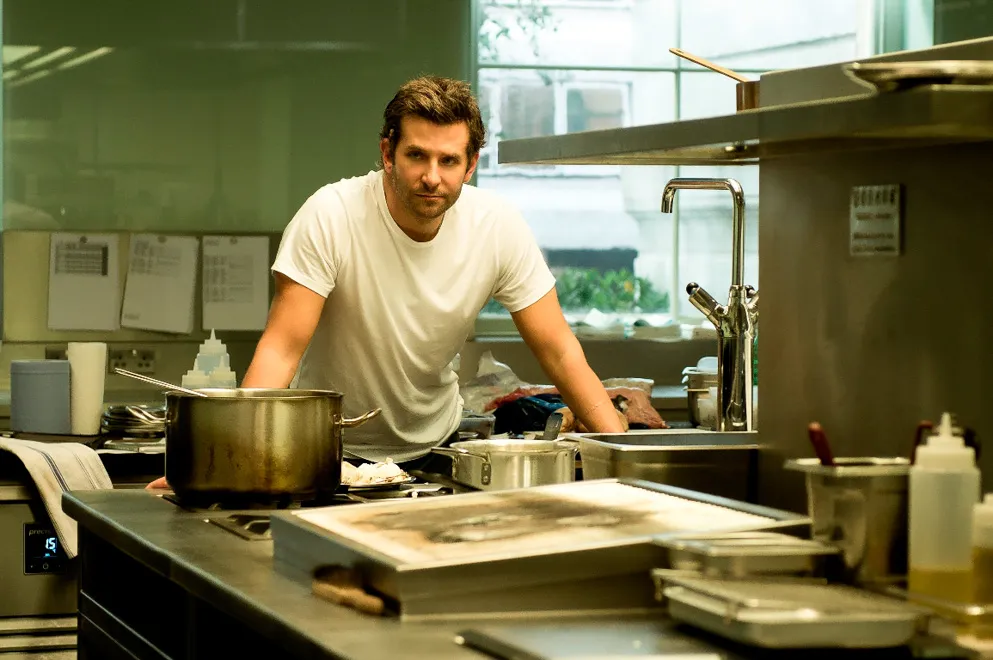In theory, Bradley Cooper as a bad-boy chef on the road to redemption should be enough to make any movie engaging. Unfortunately, in John Wells’ “Burnt,” ultra-predictable plotting and character development get in the way of originality, ultimately wasting the talents of its first-rate cast.
After burning all of the culinary bridges in Paris, chef Adam Jones (Bradley Cooper) washes up in Louisiana, where he gets sober while doing drudge work in dirty kitchens across town. Here he does his penance and he is soon ready to break back into the European culinary circuit. He begins in London by convincing an old enemy (played with nuance by Daniel Bruhl) to let him take over the kitchen at his restaurant. From here he assembles a ragtag crew of sous-chefs, including old friends, enemies, plucky youngsters, and a love interest in the form of talented chef and single mother Helene (Sienna Miller). Side plots include (but are not limited to): a therapist (played by Emma Thompson) who monitors his sobriety, an old rival who is always one Michelin star ahead, French drug dealers looking to settle some debts and an unnecessary love story with Miller’s Helene. Each thread rears its ugly head at the script’s convenience, proving both thin and pointless.
In “Burnt,” even Bradley Cooper struggles to entertain. Cooper is a good actor who has proved himself again and again, but he is unable to elevate a character made with a Gordon Ramsay cookie cutter. On the plus side, whenever his predictable redemption arc hits a few bumps in the road, he gets to freak out like we’ve seen in some of his best movies, like “Silver Linings Playbook.”
Daniel Brühl’s maître d’, however, remains a nuanced and interesting character throughout. Much credit is due to Brühl, who is such a reliable actor that it’s hard to believe he is still not getting bigger roles in Hollywood. Sienna Miller also holds her own against Cooper (as she did last year in “American Sniper”), providing just criticism and predictable inspiration. A cute scene between her daughter and Cooper actually elicits genuine emotion, until you realize that you’ve inevitably seen a far better movie with moments of similar sentiments (paging “Jerry Maguire”).
Also, for a movie about food, we see very little of it. When we do, it’s almost exclusively in the form of of crisp, brightly lit montages that are strive to stimulate the senses. They are all well done, but begin to wear as they repeat over the course of the film. Director John Wells does everything by the book, but the book is mighty boring. Within the first 15 minutes you can guess exactly what lessons Bradley Cooper will learn on his road to becoming a better person and realizing that life is about more than critical success.
There’s been a conspicuous lack of advertising leading up to the release of “Burnt,” and now it’s easy to see why. With a cast of significant actors and an uplifting plot (two classic Oscar-winning ingredients), the only good explanation is that even the Weinstein Company is trying to bury this one. Promising writer Stephen Wright (his work on “Locke” and “Peaky Blinders” has been consistently excellent) must have been truly scrambling to fix the ominously credited “story by Michael Kalesniko,” because the end product is a thin tale with low stakes that just keeps on trucking.
In the end, “Burnt” can really be described as nothing but fine, which isn’t how I want to describe a movie that includes Bradley Cooper almost self-asphyxiating with kitchen equipment while having an existential crisis. If you want a sweet, emotional movie about food, relationships and self realization, watch Pixar’s “Ratatouille.” You’ll be all the happier for it.
Contact Hannah Frakes at hfrakes ‘at’ stanford.edu.
